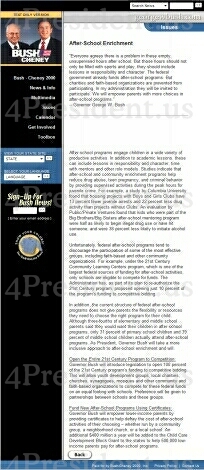|

George W. Bush 2000 On The Issues
After-School Enrichment
“Everyone agrees there is a problem
in these empty, unsupervised hours after school. But those hours should
not only be filled with sports and play, they should include lessons in
responsibility and character. The federal government already funds
after-school programs. But charities and faith-based organizations are
prevented from participating. In my administration they will be invited to
participate. We will empower parents with more choices in after-school
programs.”
-- Governor George W. Bush
After-school programs engage children in a wide variety of productive
activities. In addition to academic lessons, these can include lessons in
responsibility and character, time with mentors and other role models.
Studies indicate that after-school and community enrichment programs help
reduce drug abuse, teen pregnancy, and criminal behavior by providing
supervised activities during the peak hours for juvenile crime. For
example, a study by Columbia University found that housing projects with
Boys and Girls Clubs have 13 percent fewer juvenile arrests and 22 percent
less drug activity than projects without Clubs. An evaluation by
Public/Private Ventures found that kids who were part of the Big
Brothers/Big Sisters after-school mentoring program were half as likely to
begin illegal drug use or have hit someone; and were 38 percent less
likely to initiate alcohol use.
Unfortunately, federal after-school programs tend to discourage the
participation of some of the most effective groups, including faith-based
and other community organizations. For example, under the 21st Century
Community Learning Centers program, which is one of the largest federal
sources of funding for after-school activities, only schools are eligible
to compete for funds. The Administration has, as part of its plan to
re-authorize the 21st Century program, proposed opening just 10 percent of
the program’s funding to competitive bidding.
In addition, the current structure of federal after-school programs does
not give parents the flexibility or resources they need to choose the
right program for their child. Although three-fourths of elementary and
middle school parents said they would want their children in after-school
programs, only 31 percent of primary school children and 39 percent of
middle school children actually attend after-school programs. As
President, Governor Bush will take a more inclusive approach to
after-school enrichment and will:
Open the Entire 21st Century Program to Competition:
Governor Bush will introduce legislation to open 100 percent of the 21st
Century program’s funding to competitive bidding. This will allow youth
development groups, local charities, churches, synagogues, mosques and
other community and faith-based organizations to compete for these federal
funds on an equal footing with schools. Preference will be given to
partnerships between schools and these groups.
Fund New After-School Programs Using Certificates: Governor Bush
will empower lower-income parents by providing certificates to help defray
the cost of after-school activities of their choosing – whether run by a
community group, a neighborhood church, or a local school. An additional
$400 million a year will be added to the Child Care Development Block
Grant to the states to help 500,000 low-income parents pay for
after-school programs.
Source: George W. Bush for President 2000 Web Site |
|